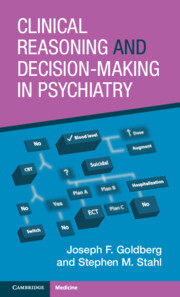Book contents
- Clinical Reasoning and Decision-Making in Psychiatry
- Reviews
- Clinical Reasoning and Decision-Making in Psychiatry
- Copyright page
- Contents
- Foreword
- Preface
- 1 Making Sense of the Senseless: How to Gather and Organize Pertinent Information
- 2 The Approach to Diagnostic Ambiguity
- 3 What the Patient Isn’t Telling You: When Seeing Is Not Believing
- 4 Shared Decision-Making
- 5 Deciding on Appropriate Treatment Modalities: Medication, Psychotherapy, Hospitalization, and Other Levels of Care
- 6 Measurement-Based Care and Applying Statistical Concepts to the Individual Patient
- 7 Hypothesis-Testing and Crafting Patient-Specific Decision Trees
- 8 Decision Points in Iterative Pharmacotherapy
- 9 Hierarchical and Complex Pharmacotherapy Decision-Making
- 10 Prioritizing the Components of Any Decision-Making Model
- Index
- References
10 - Prioritizing the Components of Any Decision-Making Model
Published online by Cambridge University Press: 25 March 2024
- Clinical Reasoning and Decision-Making in Psychiatry
- Reviews
- Clinical Reasoning and Decision-Making in Psychiatry
- Copyright page
- Contents
- Foreword
- Preface
- 1 Making Sense of the Senseless: How to Gather and Organize Pertinent Information
- 2 The Approach to Diagnostic Ambiguity
- 3 What the Patient Isn’t Telling You: When Seeing Is Not Believing
- 4 Shared Decision-Making
- 5 Deciding on Appropriate Treatment Modalities: Medication, Psychotherapy, Hospitalization, and Other Levels of Care
- 6 Measurement-Based Care and Applying Statistical Concepts to the Individual Patient
- 7 Hypothesis-Testing and Crafting Patient-Specific Decision Trees
- 8 Decision Points in Iterative Pharmacotherapy
- 9 Hierarchical and Complex Pharmacotherapy Decision-Making
- 10 Prioritizing the Components of Any Decision-Making Model
- Index
- References
Summary
If we had to pick the single most important factor that goes into clinical decision-making in psychiatry, it would not be anything related to pharmacology, psychotherapy, genetics, Maudsley staging scores, or any other kinds of historical illness characteristics, but rather, it would be determining the appropriate level of care needed for a given individual patient. Why is that, given the many breakthroughs in neuroscience and our understanding of psychopharmacology? Nobel prizes have been awarded for elucidating the intricacies of second messenger signal transduction in neurons, but not for the intricacies of deducing the merits of an intensive outpatient program versus a partial hospital program. Or for knowing when a multidisciplinary “team” approach is wiser than being seen by an individual practitioner. For all the attention heaped upon presumptive brain mechanisms of psychopathology and the impact of evidence-based treatments thought to modulate brain dysfunction, one cannot escape the psychosocial context in which most mental health conditions arise. Chronic and recurrent mental health conditions often spill into people’s daily lives in ways that can be tumultuous, volatile, and precarious. Coping with distress and adversity often can become a primary goal of treatment, and for some difficult-to-treat psychiatric conditions, questing for a medicine to eradicate chronic symptoms may sometimes need relegation to a secondary rather than primary objective. Many treatments in psychiatry are more disease-managing than disease-modifying (meaning, they may lessen the adverse impact of psychiatric symptoms but not necessarily eradicate or prevent them).
- Type
- Chapter
- Information
- Clinical Reasoning and Decision-Making in Psychiatry , pp. 276 - 307Publisher: Cambridge University PressPrint publication year: 2024



